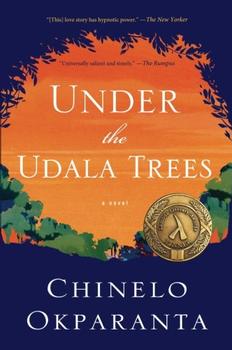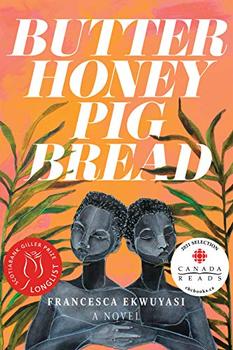Summary | Excerpt | Reading Guide | Discuss | Reviews | Beyond the book | Read-Alikes | Genres & Themes | Author Bio

Chinelo Okparanta's debut novel Under the Udala Trees is a heartfelt coming-of-age story set in Nigeria. The plot primarily follows two trajectories: life during and just after the Nigerian Civil War (July 1967 – January 1970), and the protagonist's growing sense of sexual identity in a conservative Christian culture.
Ijeoma, a Nigerian woman now in her 50s, narrates the story, relaying her past to explain how she developed into the adult she ultimately became. She begins with her childhood, which was idyllic until war came to town and ripped apart her comfortable existence in a loving household. She goes on to tell how the ensuing hardships forced her to become a servant and also led her to her first experiences of physical intimacy – and the personal struggles she endured as a consequence.
The book has many strengths, the first and foremost of which is the author's characterization. The novel doesn't have a large cast, primarily revolving around Ijeoma, her mother, and Ijeoma's lovers. First-person accounts can be especially difficult to pull off effectively; it's challenging for an author to make the protagonist's voice interesting and varied enough to keep readers entertained for the length of the novel, and also to completely develop other characters even though readers only experience them from that singular viewpoint. Okparanta pulls off this feat with seeming ease; Ijeoma's narrative voice feels completely honest and her stories about those around her ring true; even minor characters appear wonderfully real – familiar without being flat.
The writing, too, is beautifully descriptive, capturing not only the sights of Nigeria but its feel as well:
This was the normal cycle of things: the rainy season followed by the dry season, and the harmattan folding itself within the dry. All the while, goats bleated. Dogs barked. Hens and roosters scuttled up and down the roads, staying close to the compounds to which they belonged. Striped swordtails and monarchs, grass yellows and redtops – all the butterflies – flitted leisurely from one flower to the next… As for us, we moved about in that unhurried way of the butterflies, as if the breeze was sweet, as if the sun on our skin was a caress. As if slow paces allowed for the savoring of both. This was the way things were before the war: our lives, tamely moving forward.
The plotline that details life in the aftermath of war is strong, but the real highlight is Ijeoma's journey of acceptance of her love for other women in light of her society's disapproval. Her mother calls her homosexuality an "abomination," and in Nigeria being discovered to be a homosexual can lead to prison or even death (see 'Beyond the Book'). The novel goes beyond being a simple coming-of-age story or search for identity, developing into a profoundly spiritual search to reconcile the heroine's belief in a loving God with teachings that condemn an integral part of her being. The author captures her character's confusion, desire to fit in, wish to please, and her longing to simply be herself – and the portrait she paints is both complex and extremely moving.
This superb novel may not suit everyone's taste. Okparanta doesn't go into graphic detail as she relays Ijoema's liaisons, but the encounters are described explicitly enough to leave no doubt about what's taking place; more conservative readers might find these scenes challenging. Also, the book isn't a religious treatise, but Biblical texts and belief in God certainly play a large part. I'm not a particularly religious person and I found these scenes a bit disturbing at first but ultimately highly affecting; it's certainly possible, however, that those without a religious bent will find this aspect of the book distracting. The flip side of the author's views on religion and homosexuality is that those who espouse more traditional opinions may find Okparanta's take on these subjects offensive.
These cautions aside, I found myself deeply touched by Under the Udala Trees and wouldn't hesitate to recommend it to most readers. It should especially appeal to those who like reading about other countries and cultures, as well as anyone who simply enjoys a well crafted coming-of-age novel; book groups in particular will likely find it's a good choice for discussion.
![]() This review was originally published in The BookBrowse Review in October 2015, and has been updated for the
September 2016 edition.
Click here to go to this issue.
This review was originally published in The BookBrowse Review in October 2015, and has been updated for the
September 2016 edition.
Click here to go to this issue.

If you liked Under the Udala Trees, try these:

by Afabwaje Kurian
Published 2025
Set against the backdrop of 1970s Nigeria teetering between post-colonial dependency and self-rule, Before the Mango Ripens examines the enduring themes of faith, disillusionment, and the search for belonging. Both epic and intimate, Afabwaje Kurian's debut announces a brilliant new talent for readers of Imbolo Mbue and Chimamanda Ngozi Adichie.

by Francesca Ekwuyasi
Published 2020
Spanning three continents, Butter Honey Pig Bread tells the interconnected stories of three Nigerian women: Kambirinachi and her twin daughters, Kehinde and Taiye.
Your guide toexceptional books
BookBrowse seeks out and recommends the best in contemporary fiction and nonfiction—books that not only engage and entertain but also deepen our understanding of ourselves and the world around us.